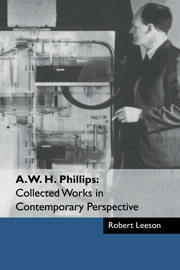Book contents
- Frontmatter
- Contents
- List of contributors
- Foreword by Arthur Brown
- Preface by Robert Leeson
- Part I Bill Phillips: Some Memories and Reflections
- Part II The Phillips Machine
- Part III Dynamic Stabilisation
- 15 The optimal control articles
- 16 Stabilisation policy in a closed economy
- 17 Stabilisation policy and the time-forms of lagged responses
- 18 Arnold Tustin's The Mechanism of Economic Systems: a review
- 19 Michel Kalecki's Theory of Economic Dynamics: An Essay on Cyclical and Long-Run Changes in the Capitalist Economy: a review
- 20 The growth articles
- 21 A simple model of employment, money and prices in a growing economy
- 22 Employment, inflation and growth
- 23 Economic policy and development
- 24 The famous Phillips Curve article
- 25 The relation between unemployment and the rate of change of money wage rates in the United Kingdom, 1861-1957
- 26 Discussion of Dicks-Mireaux and Dow's The Determinants of Wage Inflation: United Kingdom, 1946-1956
- 27 The Melbourne paper
- 28 Wage changes and unemployment in Australia, 1947-1958
- 29 Phillips and stabilisation policy as a threat to stability
- 30 The Phillips Curve in macroeconomics and econometrics
- 31 Bill Phillips' contribution to dynamic stabilisation policy
- 32 A Left Keynesian view of the Phillips Curve trade-off
- 33 Interactions with a fellow research engineer-economist
- 34 Does modern econometrics replicate the Phillips Curve?
- 35 The famous Phillips Curve article: a note on its publication
- Part IV Econometrics
- References
- Index of names
- Index of subjects
26 - Discussion of Dicks-Mireaux and Dow's The Determinants of Wage Inflation: United Kingdom, 1946-1956
Published online by Cambridge University Press: 04 May 2010
- Frontmatter
- Contents
- List of contributors
- Foreword by Arthur Brown
- Preface by Robert Leeson
- Part I Bill Phillips: Some Memories and Reflections
- Part II The Phillips Machine
- Part III Dynamic Stabilisation
- 15 The optimal control articles
- 16 Stabilisation policy in a closed economy
- 17 Stabilisation policy and the time-forms of lagged responses
- 18 Arnold Tustin's The Mechanism of Economic Systems: a review
- 19 Michel Kalecki's Theory of Economic Dynamics: An Essay on Cyclical and Long-Run Changes in the Capitalist Economy: a review
- 20 The growth articles
- 21 A simple model of employment, money and prices in a growing economy
- 22 Employment, inflation and growth
- 23 Economic policy and development
- 24 The famous Phillips Curve article
- 25 The relation between unemployment and the rate of change of money wage rates in the United Kingdom, 1861-1957
- 26 Discussion of Dicks-Mireaux and Dow's The Determinants of Wage Inflation: United Kingdom, 1946-1956
- 27 The Melbourne paper
- 28 Wage changes and unemployment in Australia, 1947-1958
- 29 Phillips and stabilisation policy as a threat to stability
- 30 The Phillips Curve in macroeconomics and econometrics
- 31 Bill Phillips' contribution to dynamic stabilisation policy
- 32 A Left Keynesian view of the Phillips Curve trade-off
- 33 Interactions with a fellow research engineer-economist
- 34 Does modern econometrics replicate the Phillips Curve?
- 35 The famous Phillips Curve article: a note on its publication
- Part IV Econometrics
- References
- Index of names
- Index of subjects
Summary
I have great pleasure in seconding the vote of thanks to the authors for this extremely interesting paper. One of the important policy problems of our time is that of maintaining a high level of economic activity and employment while avoiding a continual rise in prices. The results obtained in this paper provide valuable information on the possibilities of reconciling these objectives.
There are formidable difficulties in statistical analyses of this sort. A wide range of alternative hypotheses is possible and the series available for testing them are short. The hypotheses used in this paper seem very reasonable, though non-linear forms of the relationship might also have been considered.
The authors have chosen to work mainly with four-period moving averages of quarterly data. If there is anything in the notion of an ‘annual wage round’ a straightforward use of annual figures may have been more appropriate. It is of interest to see from table 5 that the estimates obtained using annual figures for the first quarter of each year are similar to those obtained using quarterly data, and the fit appears to be extremely good.
If we start with an error term which is a four-period moving average of independent errors of autoregressive transformation of the form 1 −¾ E−1 cannot reduce the autocorrelations for all lags to zero. The Durbin-Watson test applies only to the first autocorrelation coefficient whereas the validity of the significance test may therefore not be completely reliable.
- Type
- Chapter
- Information
- A. W. H. Phillips: Collected Works in Contemporary Perspective , pp. 261 - 262Publisher: Cambridge University PressPrint publication year: 2000



